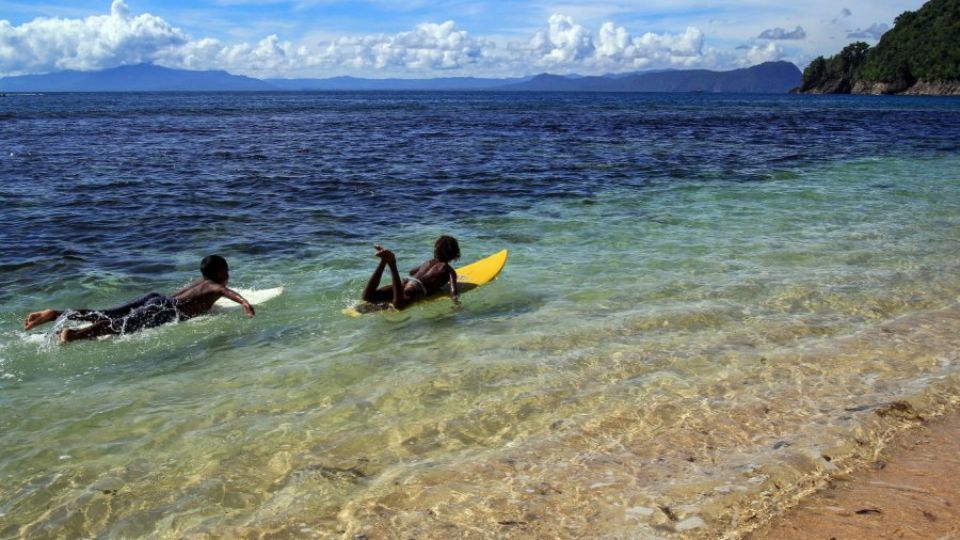June 5, 2023
JAKARTA – Environmentalists are calling for the government to revoke the recent regulation that will allow the export of sea sand after a 20-year ban, which the government is doubling down on by claiming that it prioritizes domestic demand for reclamation rather than export.
On May 15, President Joko “Jokowi” Widodo signed a regulation allowing permit holders to collect sediments, which includes sea sand, and use them for land reclamation, private and state infrastructure development and even exporting them provided that domestic needs have been met.
The Indonesian Forum for the Environment (Walhi) warned that the regulation would threaten the livelihoods of fishermen and coastal communities, and Walhi refused to be a part in implementing the regulation.
“The 28 Walhi regional directors and I urged the Indonesian President to revoke this Government Regulation No. 26/2023 and permanently stop all sea sand mining projects in as well as all reclamation projects in Indonesia,” Walhi’s campaign manager on coastal and marine issues Parid Ridwanuddin said in an online discussion hosted by Greenpeace Indonesia on Thursday.
He also warned that the regulation would worsen the climate crisis by hastening the loss of small islands, which over the long run could displace more than 23 million people in coastal communities by 2050, becoming climate refugees.
On Wednesday, Maritime Affairs and Fisheries Minister Sakti Wahyu Trenggono argued that the regulation was mainly for fulfilling the domestic demands of sea sand for reclamation projects.
“The domestic demand [of sea sand] for reclamation is huge. If we do not regulate it well then small islands could be exploited for reclamation projects or the bottom of the sea being mined, which would cause further environmental damage,” Sakti said in a press conference at the ministry in Jakarta on Wednesday.
He said sea sand used for reclamation projects according to the regulation were those from sediments, which Indonesia has an abundance of due to sea currents and oceanographic phenomena in the country.
He said according to estimates there were about 23 billion cubic meters of sediments every year that could be exploited.
He added that a research team consisting of officials from the Energy and Mineral Resources Ministry, the Environment and Forestry Ministry, the Maritime Affairs and Fisheries Ministry, universities and research centers as well as civil society organizations, such as Walhi or Greenpeace, would determine whether or not a sediment could be exploited.
In response, Greenpeace Indonesia said it refused to be involved in implementing the regulation by being part of the research team on sediments, and urged the government to revoke the controversial regulation as it could cause massive environmental damages.
Greenpeace Indonesia ocean campaigner Afdillah said the regulation was an attempt of “greenwashing” by the government.
“There is not any ecological reason in the regulation to make exploiting sediments become urgent. There is no valid data, there is no urgency,” Afdillah said in a discussion hosted by Greenpeace Indonesia on Thursday.
He also said the regulation would only serve as a way to smooth the way for oligarchs and businesses to gain profits from exporting sea sand.
Destructive Fishing Watch (DFW) Indonesia national coordinator Mohamad Abdi Suhufan also slammed the regulation, saying that the government did not provide the proper scientific data to justify the exploitation.
“The Maritime Affairs and Fisheries Ministry carelessly says that there are 23 to 24 billion cubic meters of potential sediments in the sea, while there were no surveys, research or scientific reports that explain it,” Suhufan said in a statement on Friday.
He also warned that exploiting sediments would cause further coastal erosion, as researches had found that Indonesia faced about 0.3 to 0.7 centimeters of sea level rise per year due to climate change, while parts of Kalimantan, Riau Islands and the north coasts of Java were under threat of coastal erosion at a rate of 1 to 10 meters per year.
“DFW Indonesia urged President Jokowi to withdraw and to revoke the regulation,” Abdi said.
The Riau Islands chapter of the Indonesian Fishermen Association (HNSI) warned that allowing exports of sea sand would disturb the livelihoods of fishermen who would have to contend with large dredging vessels mining sea sand.
“Those large sand dredging vessels will surely disturb marine biomes and the catching areas of fishermen,” Riau Islands HNSI deputy head Eko Fitriandi told The Jakarta Post on Tuesday.


